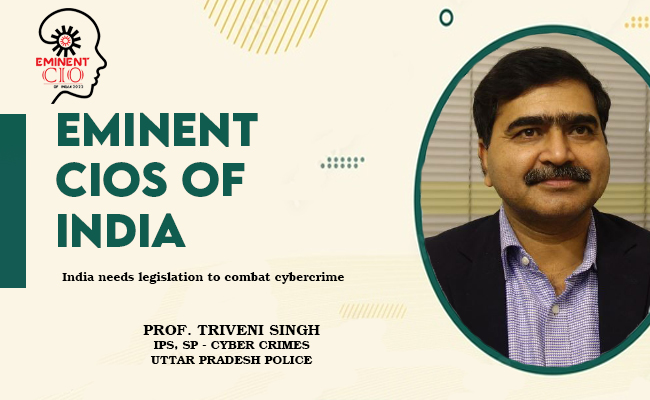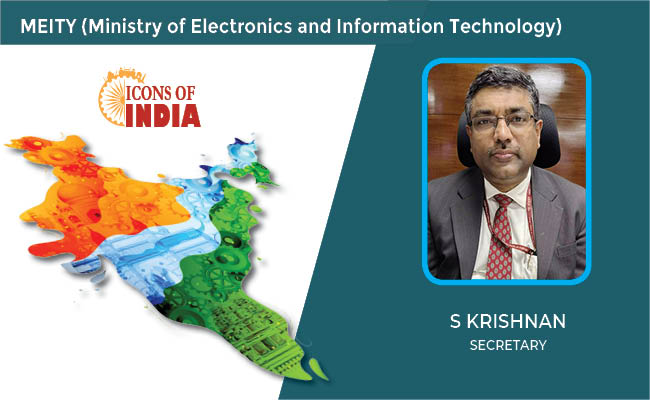India needs legislation to combat cybercrime
By MYBRANDBOOK

Prof. Triveni Singh
IPS, SP - Cyber Crimes
Uttar Pradesh Police
In this growing digital world, the biggest challenge for every country is to secure itself from the threats coming from the virtual world. Frequent cyber-attacks on critical infrastructure, state-sponsored attacks, data leaks, and other sophisticated malware have already shown the impact it can have on government, enterprises, and the common man.
Securing Critical Infrastructure
Critical Information Infrastructure (CII) refers to assets, systems, or sections of systems that are deemed critical to a country’s normal operation. We have begun to see a rampant attack on key infrastructure and large computer networks in order for hackers to disrupt daily operations.
As new technologies such as the Internet of Things (IoT) are incorporated into our national vital infrastructure, new cyber security dangers develop that must be addressed with appropriate security solutions. This, together with a growing trend toward convergence and multi-system interconnection, has given rise to a number of security concerns that jeopardise normal economic and social operations.
More Investment for Digital Defence
Given the threats posed by cyber-attacks, India must enhance its investments in upgrading its cyber security system. The separate allocation would allow the country to fund its cyber security projects on a regular basis while also encouraging innovation. Developed economies are designating distinct funding for cyber security objectives, and India should consider doing the same to ensure that 1% of its GDP is spent on cyber security to secure government networks, corporate ecosystems, and the country’s socioeconomic fabric.
Lack of Skilled Cyber Experts
The risk of cyber-attacks has increased as digital transformation has progressed. However, due to scarcity of people to secure and manage the online world, there is a high demand for cyber security professionals. However, businesses are having difficulty finding qualified security specialists. In India, there is a scarcity of appropriately skilled cyber security workers. This scarcity, which is felt at both the government and industry levels, may have an impact on India’s fight against cybercrime. The government should support research and education on cyber security. If the government invests in the capacity building of cyber security specialists, India is likely to develop a robust cyber security ecosystem.
Way Forward
There is currently no explicit regulation in India that protects against cybercrime. The Information Technology Act of 2011 must be reviewed since the scope and mode of operation of cybercrime have grown and will continue to evolve. To combat cybercrime, India requires legislation. This legal framework must be built with the ever-changing nature of technology in mind. It is also vital to ensure that conviction rates in cybercrime cases rise. This could be accomplished through legal capacity building.


Legal Battle Over IT Act Intensifies Amid Musk’s India Plans
The outcome of the legal dispute between X Corp and the Indian government c...

Wipro inks 10-year deal with Phoenix Group's ReAssure UK worth
The agreement, executed through Wipro and its 100% subsidiary,...

Centre announces that DPDP Rules nearing Finalisation by April
The government seeks to refine the rules for robust data protection, ensuri...

Home Ministry cracks down on PoS agents in digital arrest scam
Digital arrest scams are a growing cybercrime where victims are coerced or ...


ICONS OF INDIA : SACHIN BANSAL
Sachin Bansal is an Indian entrepreneur. He is best known as the found...

ICONS OF INDIA : SANDIP PATEL
Sandip Patel is the Managing Director for IBM India & South Asia regio...

ICONS OF INDIA : S KRISHNAN
S Krishnan as the secretary for the electronics and information techno...


C-DAC - Centre for Development of Advanced Computing
C-DAC is uniquely positioned in the field of advanced computing...

IREDA - Indian Renewable Energy Development Agency Limited
IREDA is a specialized financial institution in India that facilitates...

NSE - National Stock Exchange
NSE is the leading stock exchange in India....


Indian Tech Talent Excelling The Tech World - Sanjay Mehrotra, CEO- Micron Technology
Sanjay Mehrotra, the President and CEO of Micron Technology, is at the...

Indian Tech Talent Excelling The Tech World - AJAY BANGA, President - World Bank
Ajay Banga is an Indian-born American business executive who currently...

Indian Tech Talent Excelling The Tech World - Aman Bhutani, CEO, GoDaddy
Aman Bhutani, the self-taught techie and CEO of GoDaddy, oversees a co...
 of images belongs to the respective copyright holders
of images belongs to the respective copyright holders